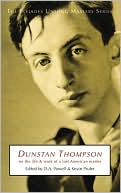 Dunstan Thompson: On the Life
Dunstan Thompson: On the Life
and Work of a Lost American Master
Edited by D. A. Powell and Kevin Prufer
Pleiades Press, 183 pages, $12.99
OVER THE PAST several years, unburying forgotten poets has become something of a trend in the publishing world, and a number of the significant writers who’ve been excavated are gay. Graywolf Press’s Re/View series, edited by Mark Doty, has reintroduced the work of key figures like James White and Thomas James to a new and appreciative readership. The most recent addition to this revived canon of lost gay poets is Dunstan Thompson.
Born in 1918, raised in Annapolis and Washington, D.C., and educated at Harvard, Thompson published two highly praised volumes of World War II-era poetry, Poems (1943) and Lament for the Sleepwalker (1947), when he was still in his twenties. Dunstan Thompson: On the Life and Work of a Lost American Master collects a number of poems from those early books, along with a selection from Thompson’s later, posthumously published works, to yield a folio of over forty pages of his poetry. Editors D. A. Powell and Kevin Prufer also present a wide, though slightly repetitive, range of supplementary materials. These include a lively memoir about Thompson by gay poet Edward Field; an appraisal by former National Endowment for the Arts chairman Dana Gioia; diversely insightful critical essays by Heather Treseler, Jim Elledge, and Katie Ford; and an extensive interview with Philip Trower, Thompson’s companion of thirty years, from their initial meeting in 1945 until Thompson’s death at their home in rural England in 1975.
Prufer’s introduction describes Thompson as “the World War II poet that literary history had failed to bring us—a poet weirdly attuned to the war even as he made of it moments of complex, even baroque, beauty and sexuality.” On the surface Thompson seems to be heir to celebrated World War I poets like Rupert Brooke and Wilfred Owen, but Thompson’s lyrical style itself carries echoes of W. H. Auden, Hart Crane, and Wallace Stevens. The poems that Thompson wrote during his youth—rhymed and metered, replete with a controlled yet dramatic diction, and studded with precise, often hallucinatory imagery—were clearly influenced by Modernism. Most notably, the haze of T. S. Eliot surrounds these poems, which Thompson, much to his credit, must have been conscious of, given that elements of Eliot’s “Preludes,” “The Wasteland,” and “Four Quartets” enter directly into Thompson’s poems at various points.
What most distinguishes Thompson’s poetry from that of almost anyone else of his generation is the brazen openness of the poet’s homosexuality and his youthful sexual escapades. Thompson served as a GI during World War II, working in the Office of War Information in London, where he lived through periods of intense bombing. That aspect of visceral wartime experience arises in Thompson’s best poems, though obliquely, via his intimate encounters with soldiers and sailors, fleeting relationships that he found both exhilarating and unfulfilling. The speaker of one short poem recalls crossing paths with Eros while cruising in a “frozen park”: “Those eyes of ice, that mouth impassioned stone,/ The whole expressionless, as though a place/ Where happiness and suffering were not known.”
Elsewhere, Thompson intricately imagines the daily grind of a Times Square hustler (in “The Point of No Return”) and a lover who “shows the scars/ Where medals of honor, cut-steel stars,/ Pin death above the heart” (in “This Tall Horseman, My Young Man of Mars”). His finest sonnet follows a similar direction with the opening lines, “This loneliness for you is like the wound/ That keeps the soldier patient in his bed,” only to close with the startlingly mature couplet, “Yet now, when death is not a metaphor,/ Who dares to say that love is like the war?”
Despite these flashes of depth and ingenuity, Thompson requested before his death that his two early poetry books never be republished. Trower, Thompson’s literary executor, has respected that wish, allowing only some individual poems to be reprinted. Thompson seems to have renounced the sexual candor of his early work mainly because he returned devoutly to Catholicism midway through his life in 1952. Edward Field’s perceptive, rambunctious essay notes of Thompson’s later poems that “religion had transformed Dunstan from brilliant bad boy to repentant sinner. The formal structure was still there, but gone was the defiant glitter of the language, the outrageously gay love poems to soldiers and sailors and airmen in World War II.” Nevertheless, in our era of manufactured celebrity, this book made me reconsider what it takes for an author to be remembered, how easy it is for writers to become lost to history, and the careful work that’s required to help us to rediscover them.
___________________________________________________________________
Jason Roush teaches at Emerson College and New England Inst. of Art.





